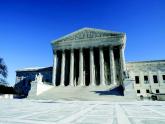News

Supreme Court agrees to hear ACA contraceptive mandate opt-out challenge
The Supreme Court is again taking up a challenge to the Affordable Care Act – to determine whether a controversial exception under the law’s...

What’s on the docket?
The Supreme Court is set to decide a number of significant health law cases this term. Here are some of the most pressing ones and the issues at stake.
Argument date: March 23, 2016
The court will decide whether an accommodation under the ACA contraceptive mandate violates the Religious Freedom Restoration Act by forcing religious nonprofits to act in violation of their beliefs, when the government has not proved that this compulsion is the least restrictive means of advancing a compelling interest. The accommodation clause refers to an exception for organizations that oppose coverage for contraceptives but are not exempted entities such as churches. The plaintiffs argue the process serves as a trigger that enables contraceptive use and makes the groups complicit. The government argues the exception does not impose a burden on the groups and that courts should not disregard the interest of employees who may not share employers’ religious beliefs.
Argument date: March 2, 2016
Justices will weigh whether two Texas regulations place an undue burden on a woman’s right to access an abortion. The regulations mandate that abortion providers have admitting privileges at a hospital within 30 miles of an abortion clinic in order to provide the service, and that all abortion clinics meet the same requirements as those of ambulatory surgical centers (ASCs). The plaintiffs, who are clinics and doctors, argue that both restrictions are unnecessary and limit access to abortion services. The Texas Department of State Health Services states the restrictions are reasonable and effective measures that raise the standard of care for abortion patients and ensure health and safety. The case is sometimes cited as Whole Woman’s Health v. Hellerstedt.
Universal Health Services v. United States ex rel. Escobar
Argument date: To be determined
In question is whether the legal theory used by the federal government to bring False Claims Act (FCA) lawsuits is valid. The case centers on a patient who died after receiving care by Universal Health Services Inc. (UHS) in Lawrence, Mass. The patient’s parents sued UHS under both the federal and state False Claims Act laws alleging that UHS providers were improperly licensed and made fraudulent government claims. The Supreme Court will answer whether the implied certification test for determining when claims “sufficiently plead falsity” under the FCA is constitutional and if so, if the relevant statute needs to explicitly state the conditions of payment with which the defendant allegedly failed to comply. Physician associations are concerned that a ruling for the plaintiff will expand the FCA’s reach and increase false claim lawsuits against health providers.
Gobeille v. Liberty Mutual Insurance Company
Argument date: Dec. 2, 2015
The Supreme Court will decide whether a self-funded insurer must share certain information, such as claims and member data, with Vermont’s all-payer database. The state argues the information is needed to improve the cost and effectiveness of health care and that an adverse ruling would chill reform efforts in other states with similar databases. Liberty Mutual, which maintains a self-insured health plan for its employees, argues that the Employee Retirement Income Security Act of 1973 (ERISA) preempts state statutes that provide for “all payer” health care databases, and that it does not have to supply the information. Analysts say the case will ultimately decide to what extent federal law can facilitate the centralized management of health care.
On Twitter @legal_med

The Supreme Court is again taking up a challenge to the Affordable Care Act – to determine whether a controversial exception under the law’s...

Physician leaders are urging the U.S. Supreme Court to strike down a Texas law that they say places undue burden on a patient’s right to end her...
